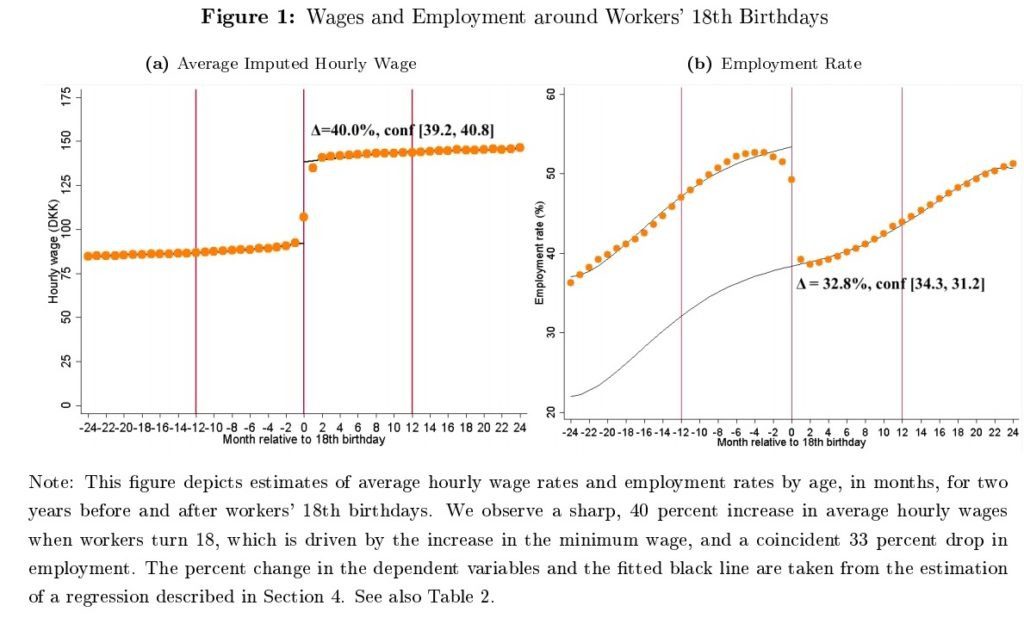
So back some time ago, after the Republicans re-took the House and, at the same time, Obama was yammering on about how he had his pen and phone, I considered the question of the minimum wage and suggested that, if a minimum wage hike was inevitable, or a potential bargaining chip, it should be paired with subminimum wage — but not the standard lower wage for under-18s. Instead, I figured that we could take a different approach.
First time entrants into the workforce (based on number of quarters of Social Security earnings history) would be paid at 70% of minimum; increasing to 80%, 90% and 100% after one, two and three years of employment. Same phase-in for the long-term unemployed — 90% for one year of unemployment (as identified via Social Security earnings, so, more of a calendar year than actual year), 80% for 2, 70% for three or more years — again in each case moving up to 100% of minimum over a period of one, two, or three years.
So does this hold up, now that there have been some reports in the news lately?
In Seattle, the data is now in, and the net effect of the minimum wage has been to reduce the total weekly wages of minimum wage workers, because employers reduced those employees’ hours to such a degree that the higher hourly wage didn’t make up for the lower work-hours.
Now, there are a lot of unanswered questions with respect to Seattle. Did employers move to increased levels of automation? Did they move more of the work outside of Seattle? Did they require greater productivity of their employers, through a literal or metaphorical “speed-up”? Did they increase the degree to which they paid workers under the table, either at a below-minimum wage or at the minimum wage, but saving money by eliminating tax withholding and other costs? The study doesn’t attempt to answer these. Likewise, the “hours lost” are a combination of jobs lost and jobs with reduced hours. What happened to the workers? Did the unemployed workers remain unemployed? Leave the workforce? Leave the city — that is, moving or finding employment outside the city limits? Did those with reduced hours find a second job, or simply make do with lower income? And, if so, did they mind all that much, or, for those who were secondary earners (or teens), were they happy to have the trade-off of extra free time?
In addition, another study out of Denmark reports that, when a minimum wage is age-based, the employment rate drops significantly when workers reach that age. Here’s the very dramatic graphic:

At age 18, workers must be paid significantly more, and simultaneously, at age 18, many fewer workers work. Are they fired? Or do they just have a harder time getting hired?
So let’s go back to my original proposal.
Yes, it would not remedy the problem of pushing the minimum wage above the level at which even experienced workers are not worth the money. Instead it presumes that the minimum wage is set based on the “value”, if you will, of a worker without specific skills but with the general ability to put in an honest day’s work, and sets a different level (or multiple different levels) for those with this (demonstrated) ability — those entering the workforce for the first time, and those with significant gaps in employment.
Would employers, under such a system, fire everyone (under some pretext or another) once they move beyond the starting wage — that is, from 70% to 80%, or 80% to 90%, or whatever? Is my proposal better than the Danish system because it is more gradual, and is based on work experience rather than age?
I suppose it depends, in the end, on how much real value there is to employers in hiring (or continuing to employ) workers with established work history, which in turn depends on how much success at work is about “work ethic” in the first place.
Readers, what do you think?
Image: https://www.flickr.com/photos/fibonacciblue/17137723666













